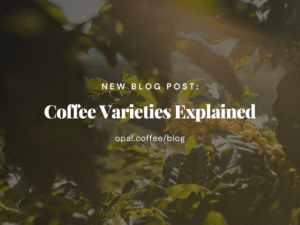
Coffee Varieties Explained
The first blog of the year is going to be about understanding coffee varieties.
With more than 125 coffee species, only two are commercially viable: Coffea arabica and Coffea canephora (robusta).
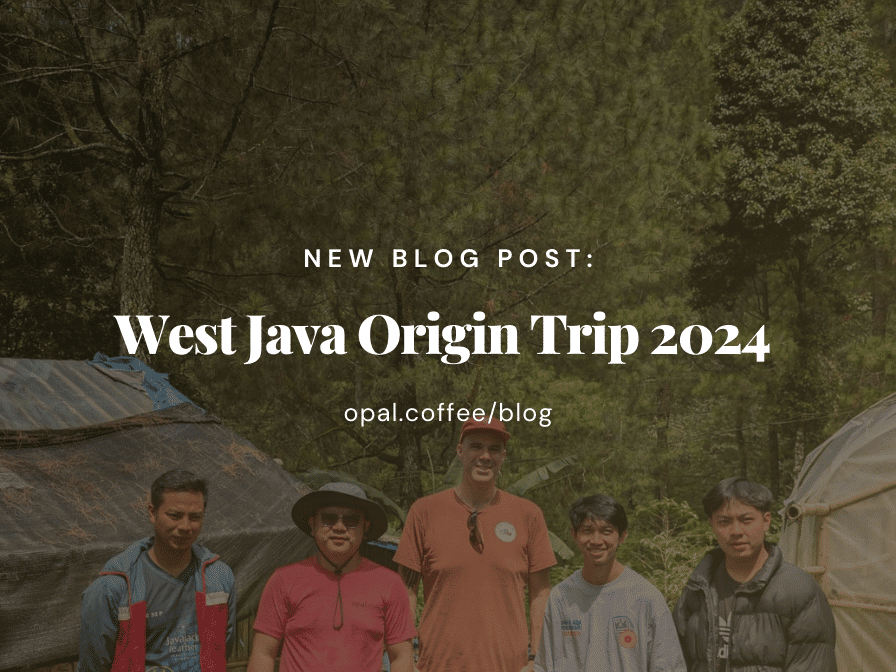
In late October and early November, Jason (Opal BNE) and Hengky (Opal SYD) traveled to West Java to visit several coffee farms, with the goal of developing a sustainable and long-term buying plan. During their trip, they gained invaluable insights into the region’s coffee production and cultivated deeper relationships with local farmers.
Opal Coffee has purchased some interesting coffee over the last few years from this area and it was clear that the region holds something special and unique.
It has a couple of advantages that are unique from the northern region of Sumatra, known as the darling of Indonesian coffee. Firstly, it has a season that is offset by 6 months to Sumatra and secondly is its proximity to Jakarta, a bustling modern city of 12 million people including many young entrepreneurs starting cafes with familiar Australian vibes and modern menus and equipment.

Our trip started there, Jakarta, a city of 12 million residents and I’d have to say most of them coffee drinkers. The first two days of our trip were spent at the International Convention centre which was home to Jaco Week, a huge coffee festival with exhibitors ranging from producers to roasters and suppliers of every peripheral you could imagine.
Here we talked to and tasted our way through hundreds of options, with the plan to visit as many of the gems that stood out to us be it growers, exporters, roasters, or baristas in the search for some unusual or unique coffees we could explore. We spent our third day in Jakarta visiting some of the shops and meeting with one of our current suppliers.
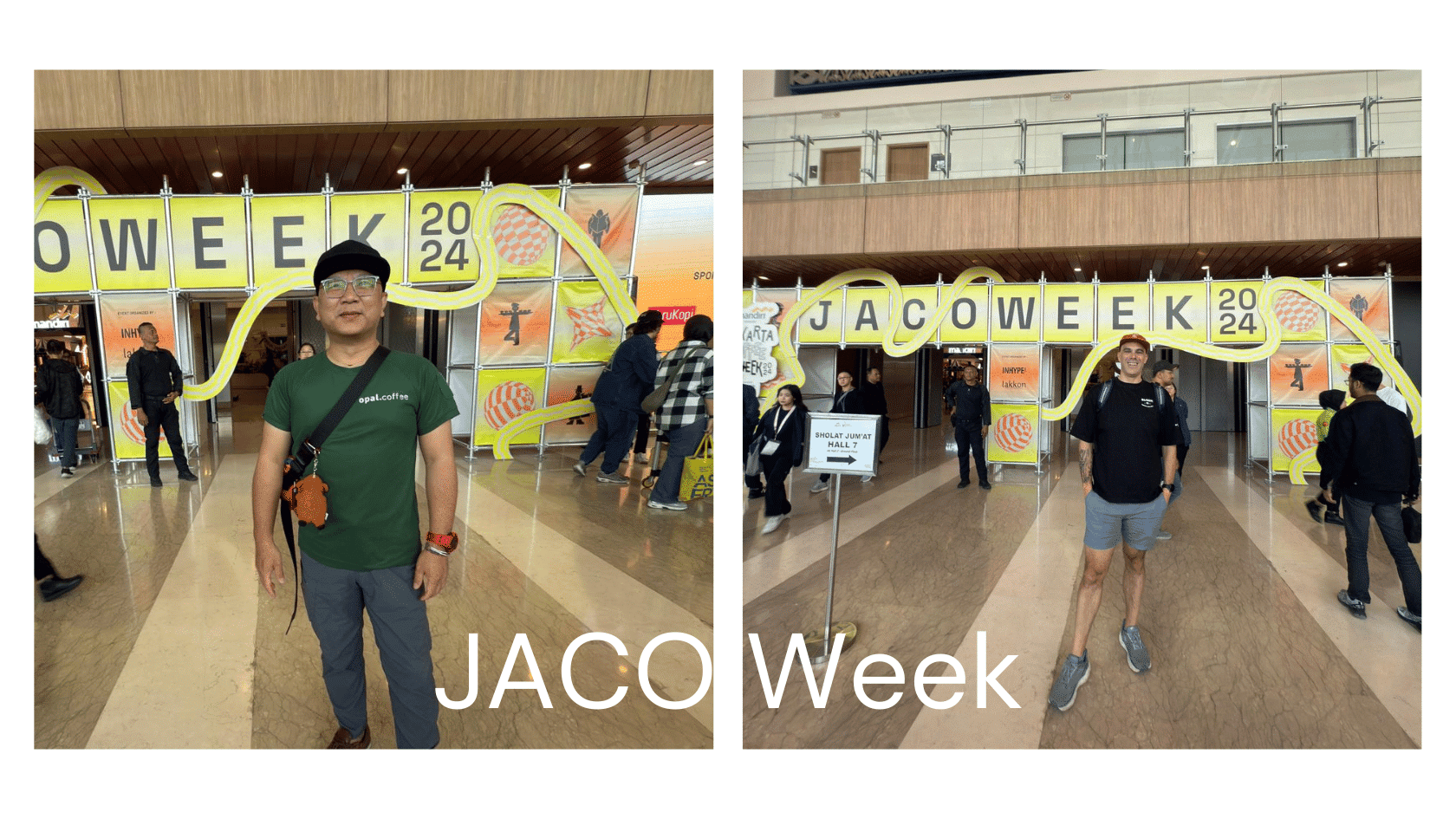
The thing that really stood out to me about the producers we met, and I have travelled to many origins both developing and established, was the number of young people wanting to get into it. They hadn’t inherited a farm; they wanted to start one. They saw a sustainable future as a coffee farmer and processor and the attitude was extremely refreshing.
The next day was the start of the long and winding journey to West Java, visiting 2 coffee shops in the city of Bundang, the capital of West Java and a central location for the next few days of the trip.
The first shop was owned by Rani, who also owns a small farm and processing station an hour away in the shadow of Mt Tilu. Rani has put everything on the line including selling her car to get this project off the ground and her success is starting to pay off, opening multiple coffee shops in the area.
We discussed her Origin story and future and made plans to visit her the next day at her farm. They then visited a shop owned by one of our current suppliers, Natcha. It is a traditional-looking café & roastery with not so traditional coffee. We met with one of the two brothers, Christian and had the same chat before making plans to visit the processing the following day.

We started early, driving into the beautiful countryside to visit Rani and her facility. We had a wonderful traditional breakfast before cupping her coffee and continuing the chat from the previous day. Rani has invested wisely, becoming a Q-grader and Q-processor. She uses ancient farming techniques with modern processing resulting in a bio philosophy of not just protecting the earth but regenerating it.
She leads by example, with a demonstration plot that shows how her techniques require fewer overall inputs but also produce higher yields. She shares this knowledge with her neighboring farmers who bring their cherries back for processing. She uses science in processing, two of her products that stood out were her enzymatic process, where coffee is fermented using an enzyme created to mimic the digestive system of the Luwak.
It was intensely floral and tropical, allegedly what real wild Luwak coffee is supposed to be. The other was her inoculated natural fermentation started with the aim of fermenting sap from a local sugary plant. This visit was a true highlight of the trip, and we very much look forward to working with Rani and Java Halu for years to come. I am so glad we met by chance at Jaco Week.

Next on the List was Natcha Coffee processing.
This place is insane and one of the most sophisticated coffee processors I have ever visited. Natcha is their signature process, alongside traditional wet-hulled coffee. It’s a long and complicated processing journey however I will try break it down simply.
Only cherries with a certain range of sugars are used, these are all measured with a brix meter before being taken into the temperature and humidity-controlled dome. Then, they undergo thermal shock before being dehydrated to a raisin. Then they are rehydrated in order to be pulped where they are covered and cured, retaining the moisture. They are then put into a Carbonic Maceration tank with either red or white wine yeasts. They are then dried in parchment to 45% before being wet-hulled and dried as green bean to the required 12% moisture.
The flavor is indescribable, and the coffees are regularly scored over 90 points by some of the most renowned Q-graders in the world. The equipment required to complete this process repeatedly is incredibly sophisticated and they even grow their own yeast cultures on site.
We have purchased coffee from Natcha several times this year and many of our Australian customers are receiving great feedback. It was a privilege to visit them and strengthen the relationship while discussing how we can work and grow together into the future.
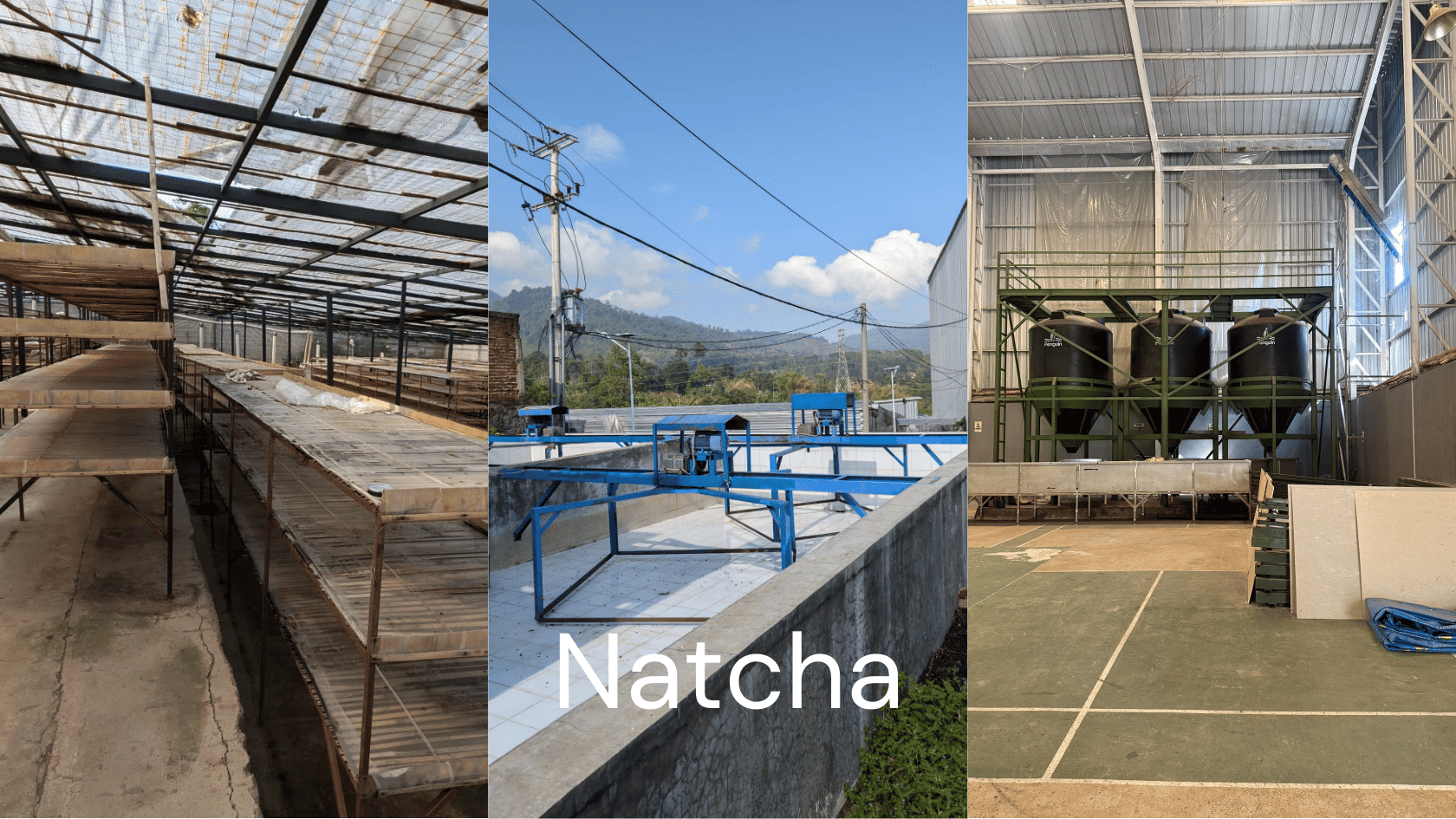
Our next visit was to a more traditional farm.
This farm is nestled in the government pine and eucalypt plantations in a system quite common in West Java. The coffee here is old, and the farming methods are as old as coffee in the area. The coffee is all Wet-Hulled and mostly shipped to Sumatra to be sold as Mandheling coffee. This is a fairly common practice and if you are seeing cheap Mandheling coffee offered, it is usually from this type of arrangement. We chatted with interest but agreed this type of coffee was not on our buying radar.
The next part of the region saw us meet up with two existing suppliers, first up was a young processor with some very interesting coffees. We often don’t get a chance to taste these types of coffees until you visit.
Abstract Coffee processes washed, natural, and honey coffees with variations of fermentation added to each. It was a beautiful site, and the conversation flowed easily. Like many of the people we visited, Abstract has not been in business for more than a few years, but they are hitting all the right targets and producing some amazing coffees. I would be very surprised if we were not offering their coffee across all three of our sales destinations next year.

Next up was our existing supply partner Malabar Coffee.
While the operation is well established, the young husband and wife team are making traditional coffees the right way. They do not have the biggest offer list; they produce washed or natural coffee. But it was clear that by focusing all their energy on a small offer list, the proof is in the pudding. Clean, bright and structured washed Java coffee would make a great addition to any roaster’s blend who is trying to create heavy blends that cut through lots of milk or present as a fuller lighter roast.
The natural is clean, juicy, fruit driven and balanced with just the right fermentation to sweetness balance. This coffee is already inbounded to Australia, and I am very excited to share it with you. Their processing facility reflects their product, and it was very obvious to see why the natural stood out on our cupping tables. Clean and organized facility, beautiful natural surroundings, and friendly people involved all around….it really does reflect in the cup.

Our last West Java visit saw us leave the Mt. Tilu side of Bundang and head over to the picturesque Mt Puntang. Here we visited a Nano processing station that our supplier Collective Project does all their higher end Nano Lots at.
They do a lot of traditional washed, natural, honey, anaerobic of all those, and extended fermentation methods at all their sites and we have some of the Cianjur Anaerobic Honey in New Zealand now, however this site was right up near the plantations in the government estate of Mt Puntang. At this site they process individual varieties such as Red Bourbon, Yellow Bourbon, Typica, Catuaii, Caturra, and P88.
After tasting some coffee, we hiked up into the steep plantation before returning for an amazing homestyle lunch. This group of young farmers have chosen the simple life of enjoying an amazing environment away from the city, living simply with friendship ang good vibes, and are producing some amazing coffee. Their love was felt all the way back to Jakarta and I hope to experience it again when drinking their coffee.

It was an incredibly eye-opening trip with lots of opportunities and challenges identified. As a green coffee trader, it is important to visit the people you work with and get a firsthand account of what we are all facing in the ever-changing landscape of specialty coffee.
West Java in particular has so many small producers that struggle to get their coffee to export and often rely on collectors or further marketing agents. We were able to start a conversation about utilizing the facilities and experience within the small holder group to consolidate shipments without the need for further companies getting involved. This has been one of the biggest challenges to the cost and timing of these coffees.

The first blog of the year is going to be about understanding coffee varieties.
With more than 125 coffee species, only two are commercially viable: Coffea arabica and Coffea canephora (robusta).
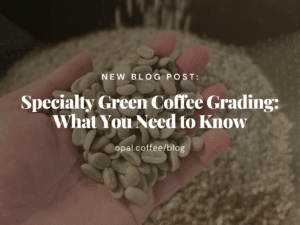
We recently had some Mountain Water Process Decaf land in New Zealand and we thought this would be a great opportunity to provide some information on the two types of Decaf that we currently have in our warehouses.
© Copyright Opal Coffee 2025. All Rights Reserved | Privacy Policy — Designed by Hoot Media
